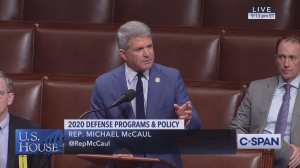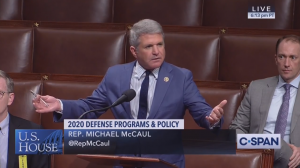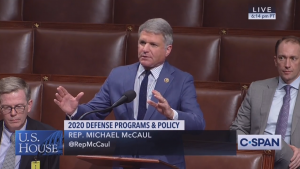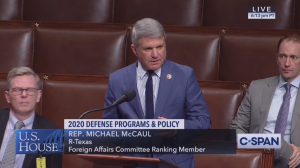ICYMI: McCaul Speaks on House Floor to Oppose NDAA Amendments that Repeal AUMF Authority, Threaten National Security
Amendments 423, 424, and 425 would tie the hands of our military and undercut important legal authorities to combat terrorism
Washington D.C. – During last night’s floor debate, House Foreign Affairs Committee Lead Republican Michael McCaul (R-TX) took to the House floor to rebuke his Democrat colleagues for introducing amendments to the National Defense Authorization Act (NDAA) that recklessly endanger U.S. national security. Specifically, McCaul spoke against amendments 423, 424, and 425 that would tie the hands of our military and undercut important legal authorities for combating terrorism, despite the continued threat from terrorist organizations. Key highlights below:
Amendment 423, prohibits unauthorized use of military force in or against Iran:
“This amendment goes much farther than prohibiting an unauthorized war with the number one state sponsor of terror. It uses the power of the purse to preclude any use of force whatsoever against Iran, unless it is previously authorized by Congress or provoked by an attack on the United States or our armed forces. Think about what that means.
“What can our military do if Iran attacks American civilians, or our regional allies like Israel and Jordan, or strategic international shipping through the Strait of Hormuz?Under this reckless amendment, the answer is: Absolutely nothing.”
“Bottom line, this amendment will give comfort to our enemy, who has the blood of Americans on their hands — from the Marine barracks bombing to the Iraq War — and who continues to hold American hostages to this day.”
For full remarks, click here. For a video of remarks as delivered, click here or the photo above.
Further debate of Amendment 423:
“Why are we debating such an important issue – matters of war and peace – … at 9:15 at night … In the darkness of night, and not the sunlight of day?
“This is a dangerous amendment. It is a preemptive use of the AUMF. We have not engaged in hostile forces, combat forces in Iran. We have not engaged in hostilities. That is when the war powers resolution kicks in, notification to the Congress, and then Congress debates the authorization of the use of military force. I’ve been in this body for eight terms. That is how the process works.
“You don’t handcuff the president, the commander in chief, in advance of any preparation for dealing with a hostile state sponsor of terror. This is just wrong.”
For full remarks, click here. For a video of remarks as delivered, click here or the photo above.
Amendment 424, repeals the 2002 Iraq AUMF:
“While the Saddam Hussein regime was a key focus, it was not the sole focus of the 2002 AUMF. It also expressly identified Al Qaeda and “other international terrorist organizations, including organizations that threaten the lives and safety of United States citizens.”
“Members will recall that Al Qaeda in Iraq later became ISIS, a brutal transnational terrorist organization that continues to threaten American lives and interests.”
“We shouldn’t be repealing key counterterrorism AUMFs unless and until we have replaced them with updated authorities that clearly confront the enemies that continue to threaten our nation, our people, and our allies. To date, we have seen no such proposal from the majority.”
For full remarks, click here. For a video of remarks as delivered, click here or the photo above.
Amendment #425, Complaints that 2001 AUMF used beyond what Congress intended:
“It would simply be irresponsible and dangerous to repeal [the 2001 AUMF] until an adequate replacement has passed both chambers and been sent to the President’s desk.”
“Unfortunately, the threats continue: As the Director of National Intelligence has testified, Al Qaeda and ISIS maintain transnational networks actively committed to our destruction.”
“Don’t get me wrong: I’d like an updated AUMF, too. But this misguided amendment contributes nothing toward that outcome. Until we have new authorities in place to combat the real and dynamic threats to American lives and safety, we need to focus on responsibly using the authorities we have, not just complaining about their imperfections. If the other side is serious about “a fix”, then please provide a serious one to begin this process.”
For full remarks, click here. For a video of remarks as delivered, click here or the photo above.
###



